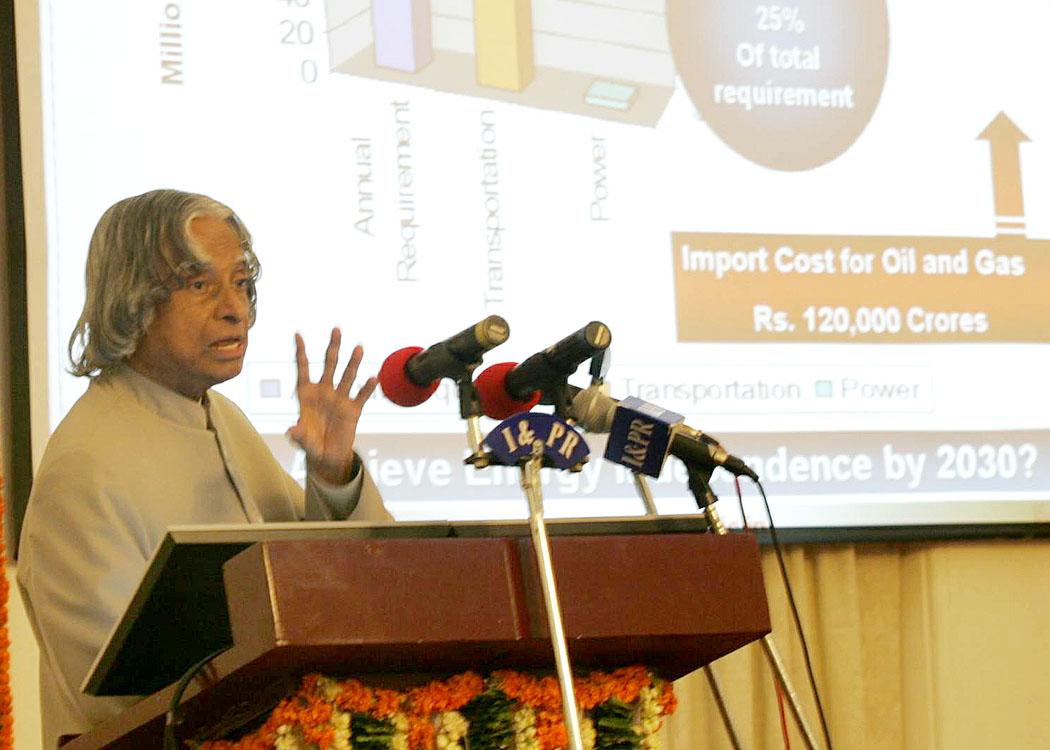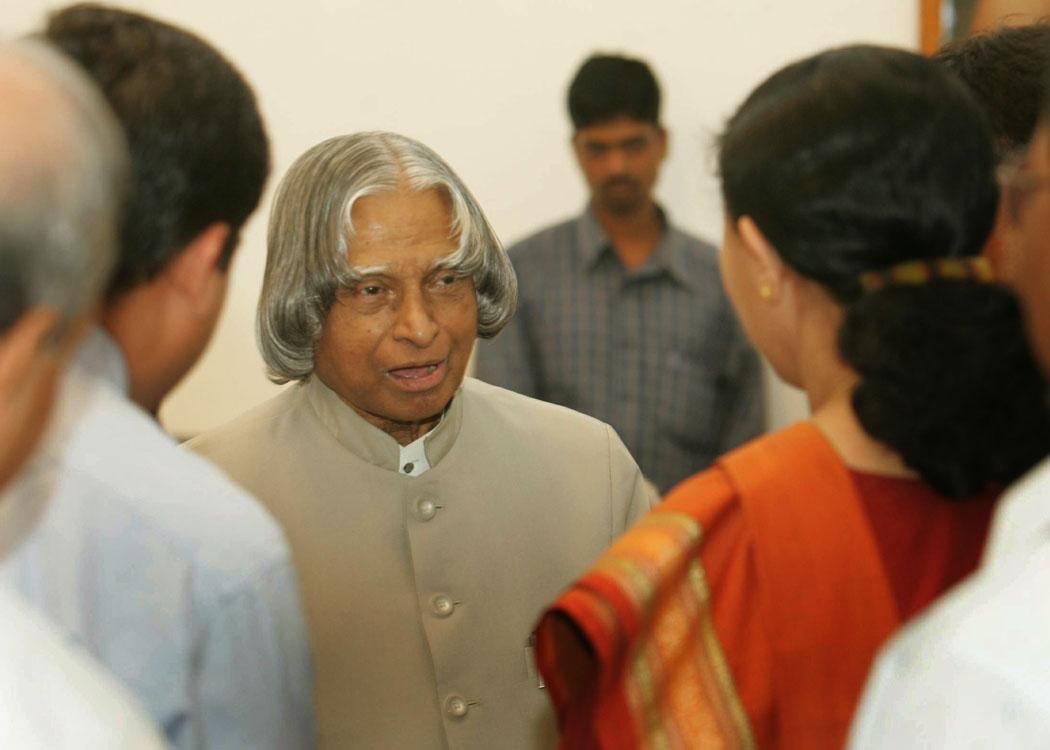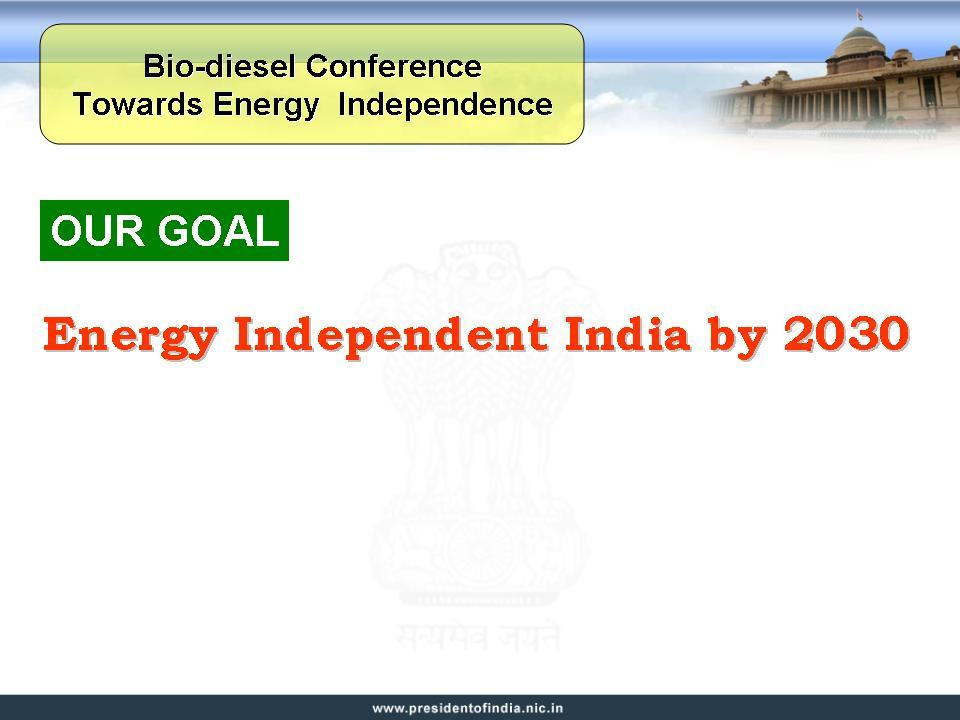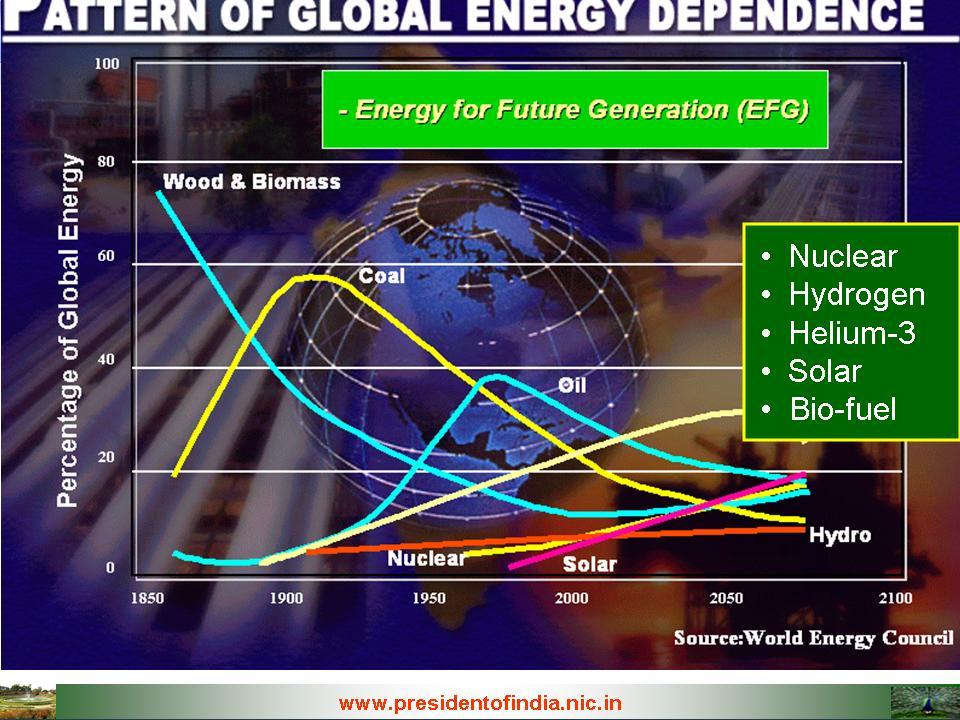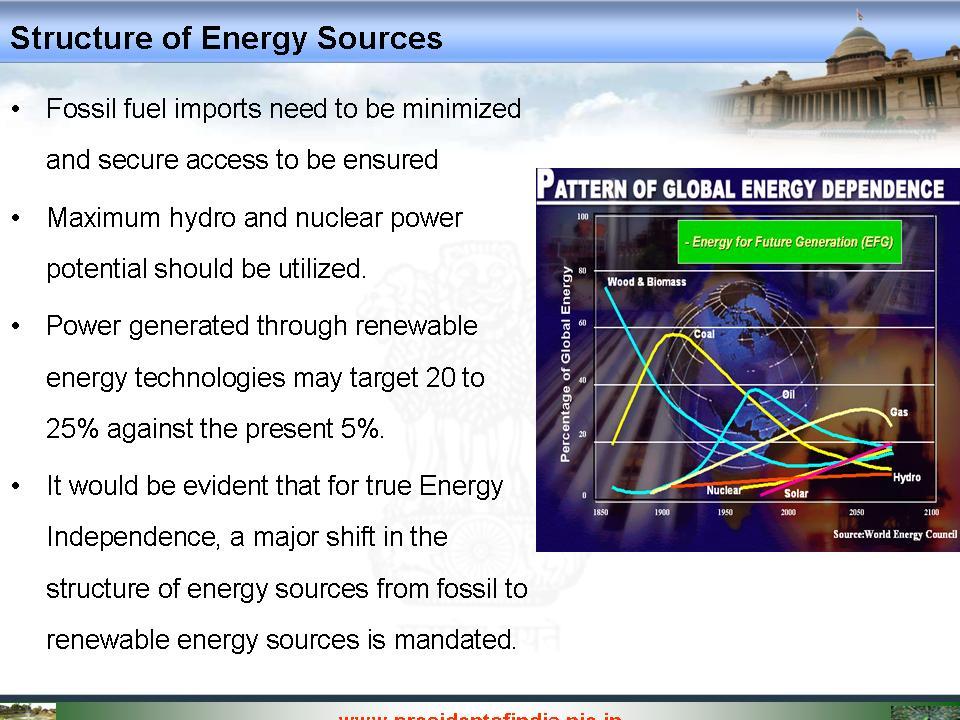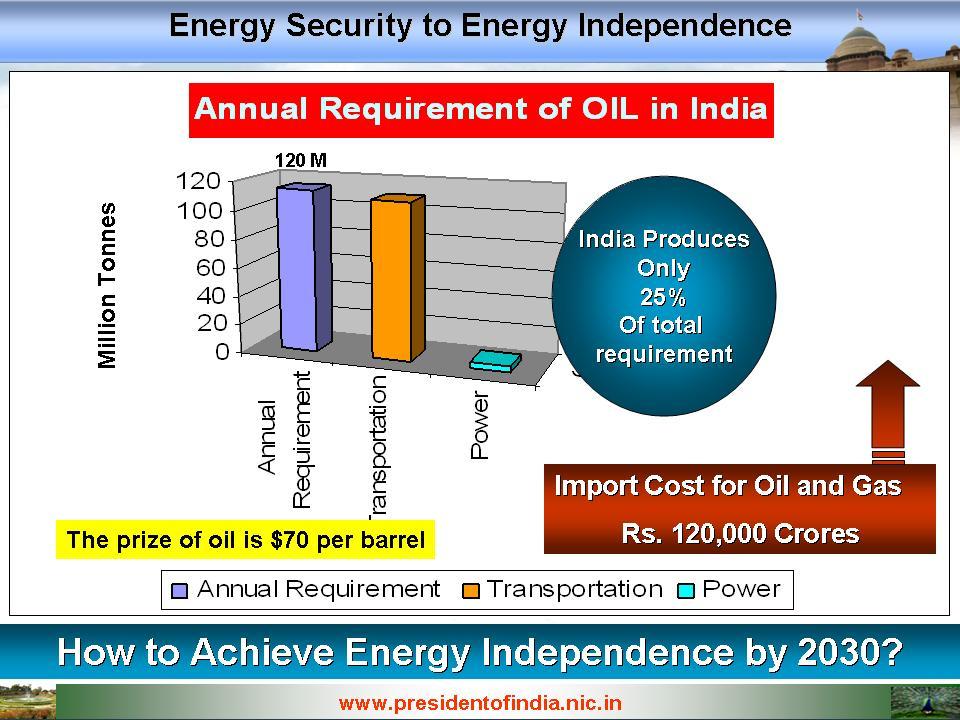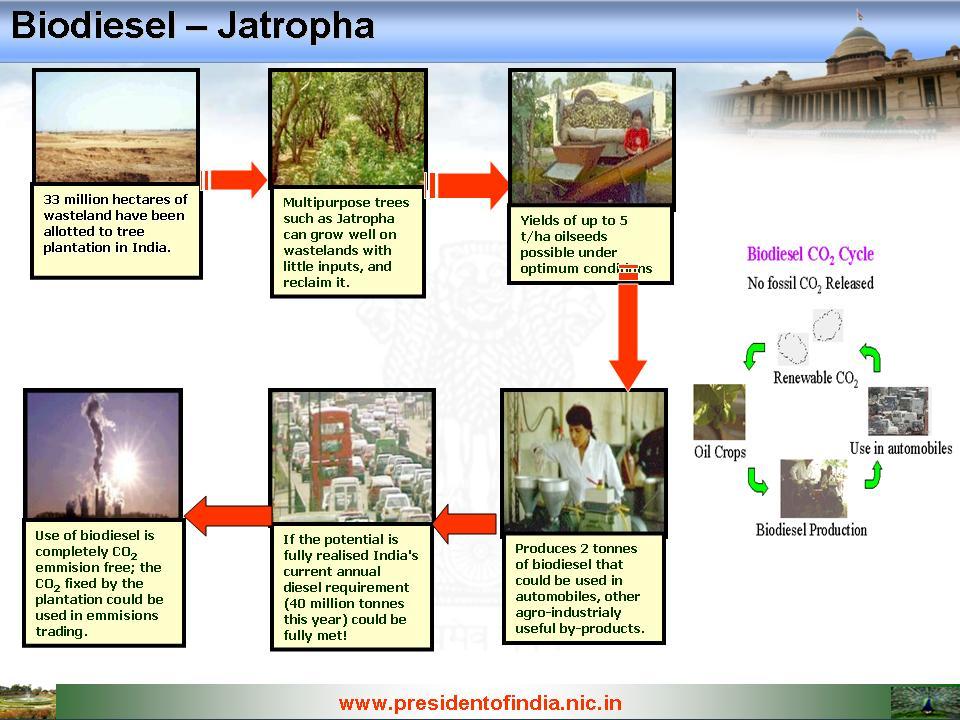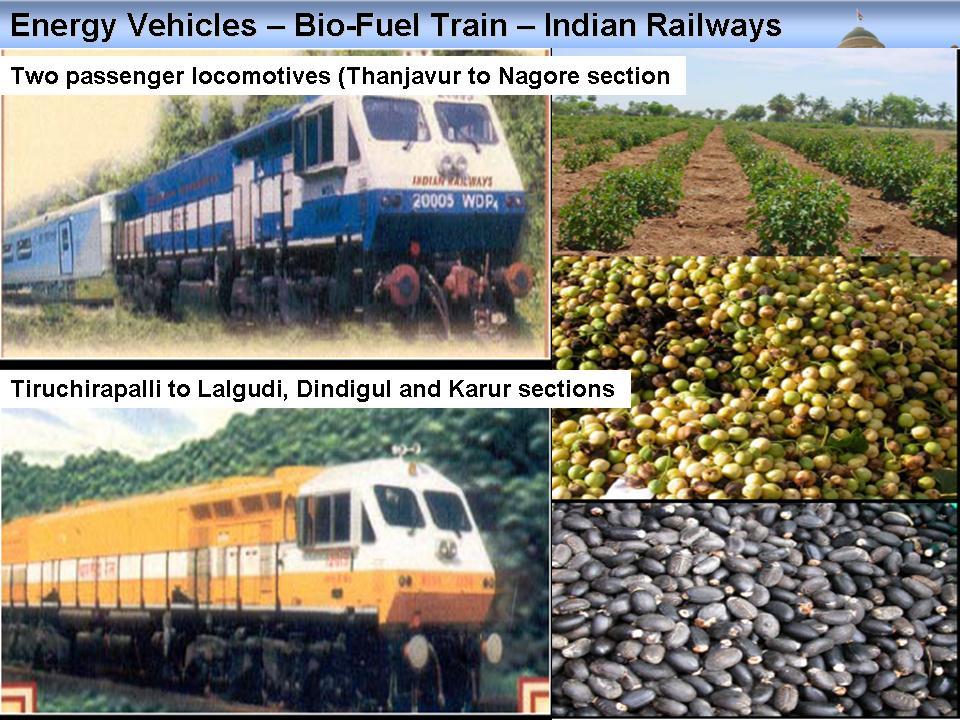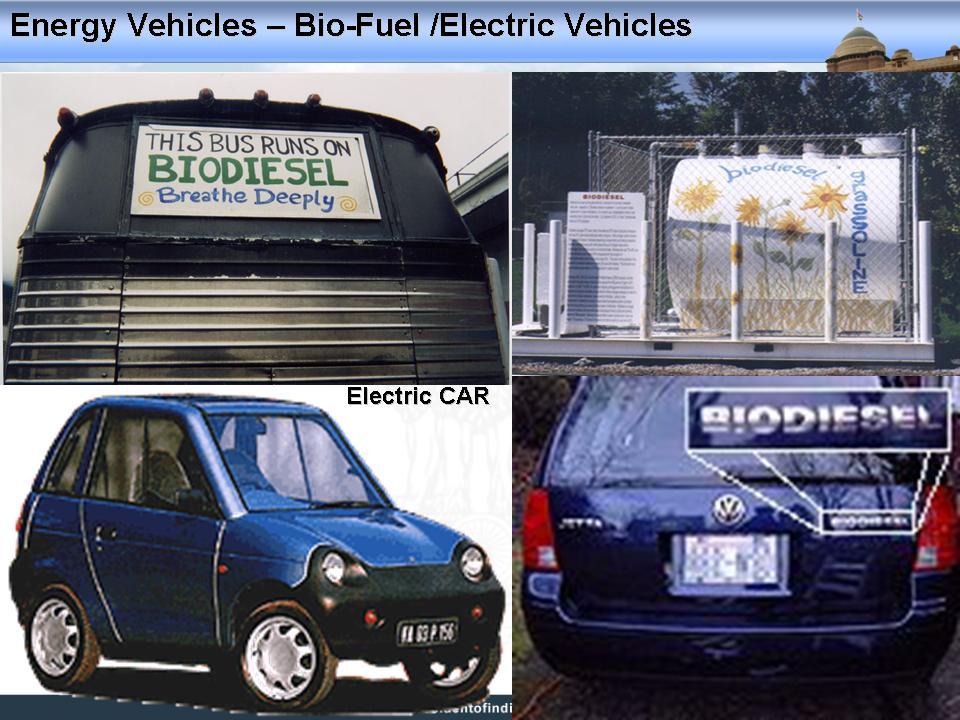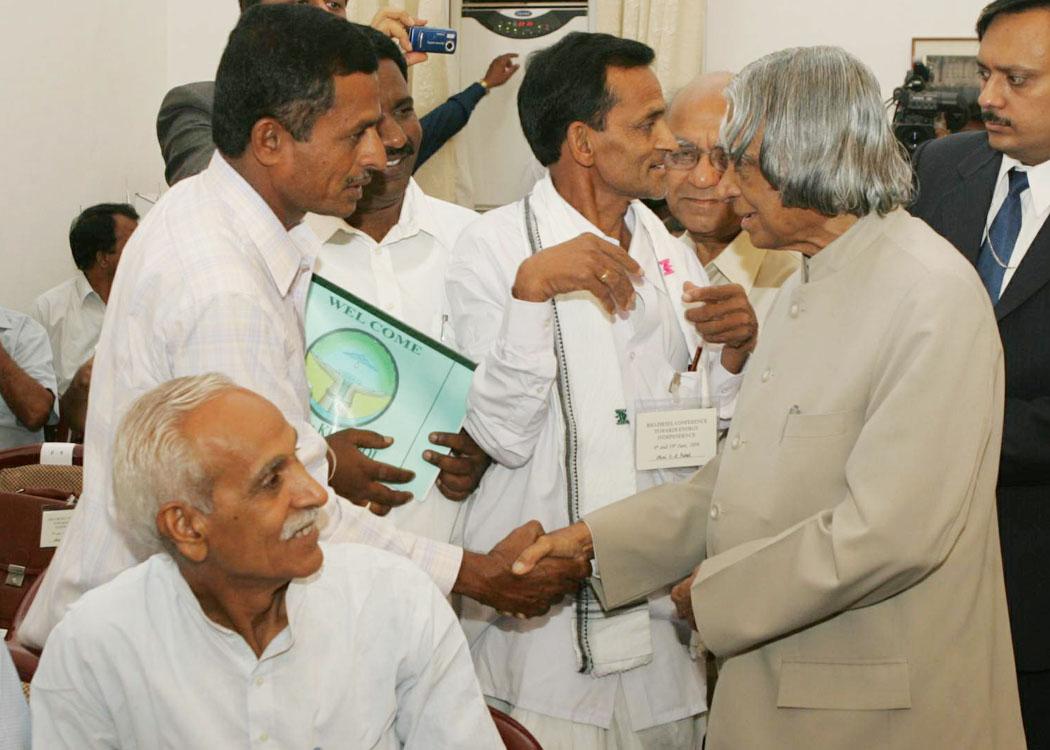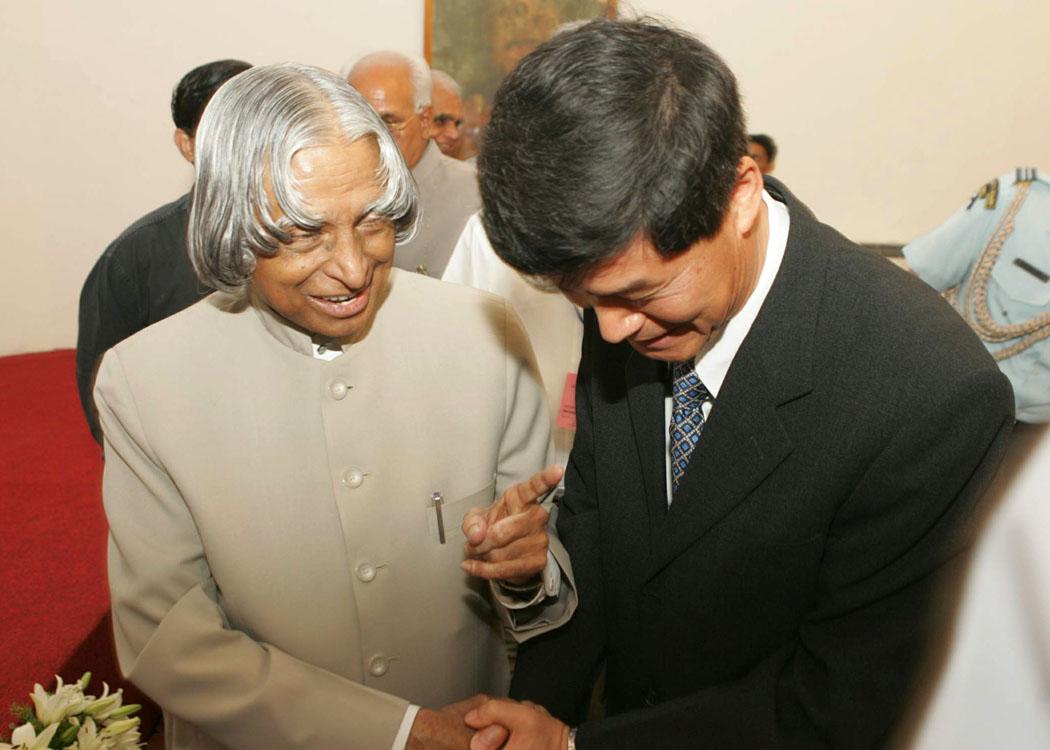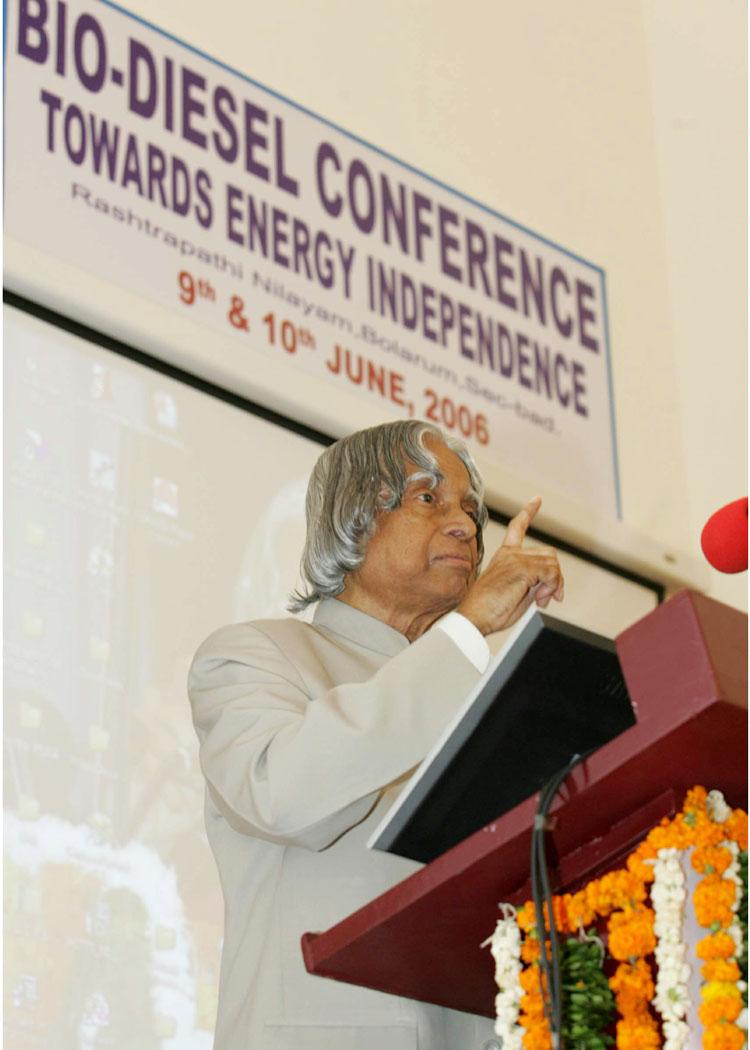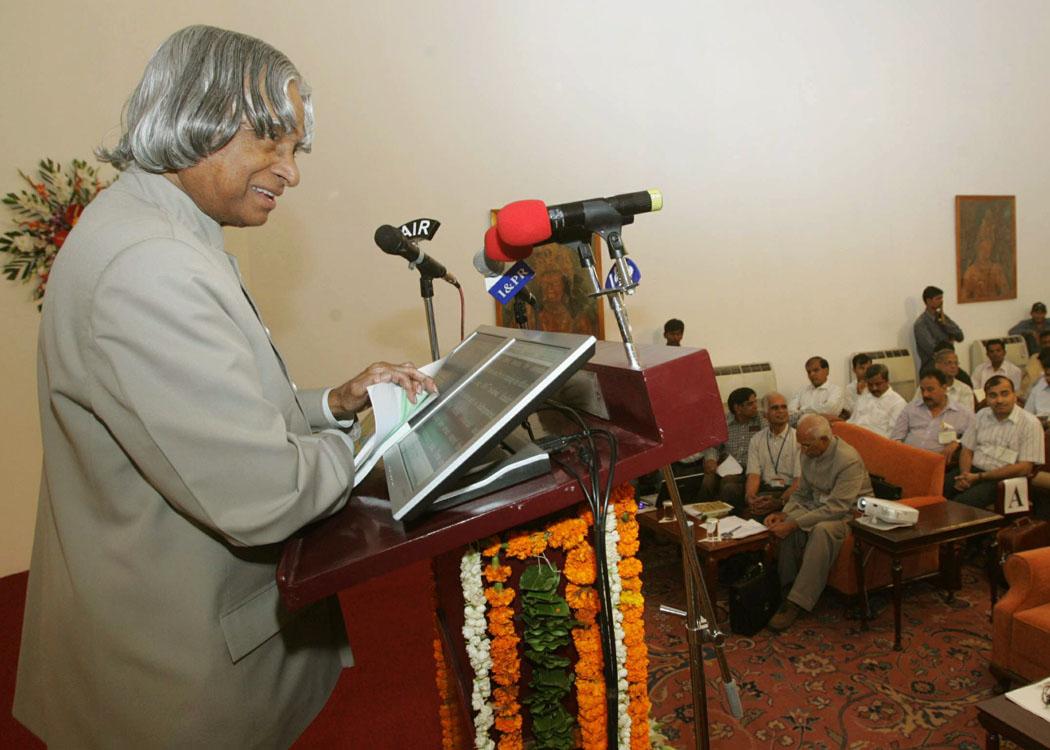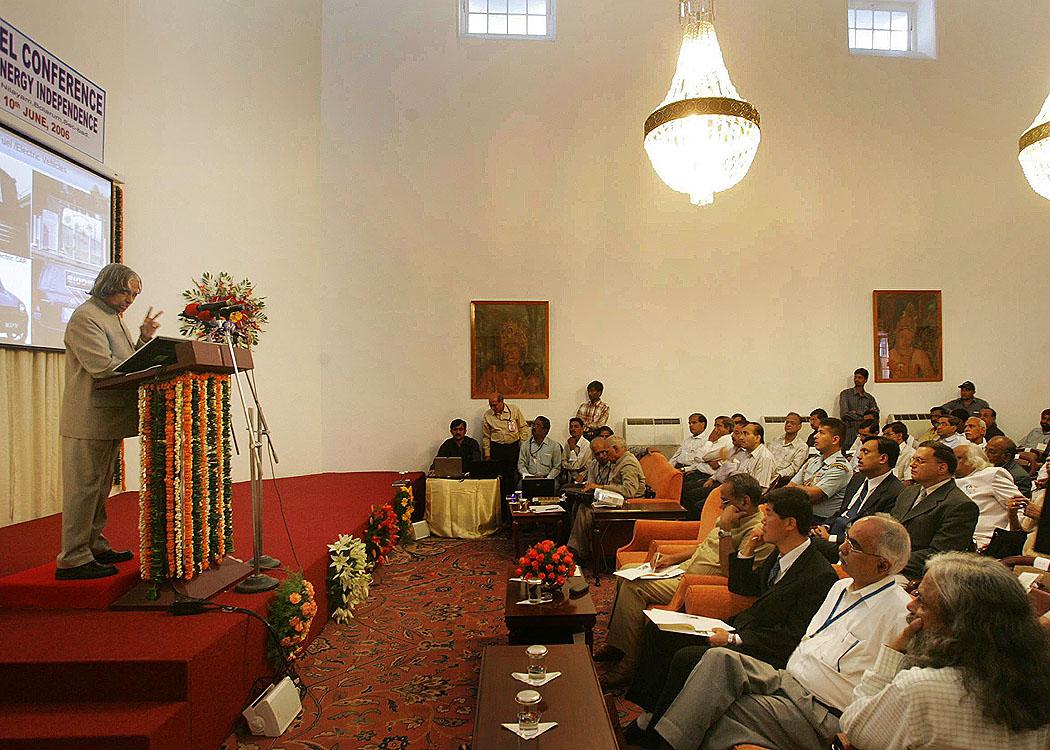Address at the Inauguration of Bio-Diesel Conference Towards Energy Independence at Rashtrapati Nilayam, Hyderabad
Hyderabad : 09-06-2006
Bio-diesel mission
"Energy Independence is the lifeline of a nation"
I am delighted to inaugurate the "Bio-diesel Conference towards Energy Independence" organized by Rashtrapati Bhavan. The purpose of the conference is to facilitate meeting of the minds of people who are working in the area of Bio-fuel. This meet should help the farmers to gain confidence in Jatropha cultivation, Jatropha seed extraction and crushing, oil esterification, blending and marketing. My greetings to the participants from the Central and State Governments, Scientists and Researchers, farmers, Bio-diesel industrialists, societal transformers, academicians, oil companies, automobile industrialists, energy experts, energy planners, and distinguished guests participating in this conference. I particularly greet the Andra Pradesh Government for facilitating the organization of this conference in Rashtrapati Nilayam at Hyderabad.
Energy Independence
The era of wood is almost nearing its end. The world energy forum has predicted that fossil based oil, coal and gas reserves will last for another less than ten decades. The unpredictable increase in the cost of oil continuously prompted me the study the Energy scene. Based on the study I have discussed about Energy Independence as part of my Independence Day Address to the nation, on 15 August 2005. There I mentioned that Energy Independence has to be our nation?s first and highest priority. Our target is to achieve Energy Security by 2020 leading to Energy Independence by 2030 and beyond.
Structure of Energy Sources
The strategic goals for Energy Independence by 2030 would call for a shift in the structure of energy sources. Firstly, fossil fuel imports need to be minimized and secure access to be ensured. Maximum hydro and nuclear power potential should be utilized, apart from the use of coal and gas based thermal power generation. The most significant aspect, however would be that the power generated through renewable energy technologies has to be increased to 25% against the present 5%. It would be evident that for true Energy Independence, a major shift in the structure of energy sources from fossil to renewable energy sources is mandated.
As the transportation sector in India consumes about 90% of the total available and imported oil, I would like to discuss the possible energy policy in this sector.
Energy in Transportation Sector
The Transportation sector in India is the fastest growing energy consumer. It now consumes nearly 120 million tonnes of oil annually, and is critically important for Indian economy and security. We produce only 25% of our total requirement. The cost of the total oil import is over $25 Billion. The price of the oil is on the rise and presently is over $70 per barrel. In the present scenario of dependability of fossil material based systems with its uncertainty it is essential that an energy policy is evolved with new energy avenues.
Today, the focus of this conference is on Bio-diesel and methods by which we can realize energy independence progressively.
Use of Biofuel: India has nearly 60 million hectares of wasteland, of which 30 million hectares can be made available for energy plantations like "atropha"or any other bio-fuel plant. Once grown, the crop has a life of 50 years. Our aim should be to produce minimum 2 tonnes of bio-diesel per year per hectare, which will result in the production of 60 M/tonnes per year in full capacity in an optimistic environment.
I have visited Tamil nadu Agriculture University, Anand Agriculture University and Periyar PURA where I have witnessed the Jatropha Cultivation to esterification process. In TNAU, I have seen the hybrid varieties of Jatropha plantation, which gives increased oil content. They have designed and developed and manufactured the 250 liter bio-diesel plant, which is producing the bio-diesel and is used in running jeeps, diesel pumps.
Also, In Anand University, the tractors and the water pumps were being run fully on bio-diesel, I have seen the extraction and crushing plants working in Anand University. Indian Railways has already taken a significant step of running two passenger locomotives (Thanjavur to Nagore section) and six trains of diesel multiple units (Tiruchirapalli to Lalgudi, Dindigul and Karur sections) with a 5% blend of bio-fuel sourced from its in-house esterification plants. In addition, they have planted 75 lakh Jatropha saplings in Railway land which is expected to give yields from the current year onwards. Based on my experience in Bio-disel, I have addressed 10 state assemblies, where in I have given the Bio-fuel mission is one of the missions for the states who are having potential to plant the bio-fuel plants in a big way. The Chief Minster of Chattishgarh, has given great thrust towards the Jatropha cultivation and he is running his official cars using 100% bio-diesel. Similarly certain states such as Andhrapradesh, Madhya Pradesh, Uttranchal and Tamilnadu have already started the energy plantations in India. These are some of the pioneering example for many other states and the organizations to follow. With this scenario, let us see what could be our mission?
Mission: Our mission should be to realize 60 M tonnes/per year of Bio-diesel by 2030. As a first step towards reaching this capacity, let us plan for 6 Million tonnes production by 2010 that is 5% of the present import of oil. Progressively we need to aim at improving the plantation and yield towards achieving 30 million tonnes of bio-diesel by 2020.
Bio-Diesel Issues
Based on the experience of my visits and interaction with farmers and number of e-mails that I have received, I would like to present the real concerns of the farmers and other stakeholders. Farmers have started cultivating Jatropha in many areas. But they have certain problems such as low productivity, non-availability of standardized good seeds and technical advice. Let me share with you certain concerns for discussion in this conference at Hyderabad, so that it may lead to evolving a comprehensive National Bio-diesel Policy action Plan.
1. Region specific standardized, quality, high yielding variety hybrid seeds suitable for various agro climatic conditions in the country through intensive R&D effort.
2. Land (waste land, forest land, dry land, and semi-arid land etc. - private and public land) availability and minimum irrigation potential for improving the yield and water shed management.
3. Bringing small farmers together into a cooperative venture or society on the lines of Amul Model.
4. Banks have to promote entrepreneurs for Jatropha cultivation to esterification. Venture capital has to take shape.
5. Inter cropping and value addition to byproducts for increasing the revenue to the farmers.
6. Public ? Private partnership and contract farming with farmers and self-help groups and integrating bio-diesel enterprises with PURA Clusters as a self-sustaining business proposition.
7. Integration of oil extraction and esterification agencies and preparing specification for modular extraction and esterification plants in various tonnages, which can be used at the proximity of the raw material, enabling decentralized supply of bio-diesel reducing the transportation cost. R&D for modular plants with various tonnages and maximum extraction and esterification efficiency. Potential exists for quantity production of esterification facilities in the small scale sector.
8. Identification of agencies for processing Jatropha Seeds without any ambiguity and identification of professional bodies for extraction, esterification and blending.
9. Initiatives by vehicle manufactures in incorporating appropriate modification and redesign for using different levels of blending for optimal performance and ultimately leading to 100% bio-diesel vehicle.
10. Role of Academic institutions, particularly agricultural Universities of different states in partnership with Private and Public enterprises in facilitating the Bio-diesel enterprises from seed to esterification with the research inputs.
11. Role of Central, State Governments and district authorities in promoting and facilitating the total chain of Bio-fuel tasks.
Possible Actions:
Let me now express some thoughts for your discussion today.
Research, Development and Production of Plant variety: India's waste land is spread in different regions with different climatic conditions and also falls in the category of rain fed or irrigated land. To cater to this variety of soil and climatic conditions research is required to determine the particular plant variety which will give the maximum yield of Jatropha seeds and the maximum yield of oil from that particular seed. Also research is required to find varieties of species and hybrids which will start yielding Jatropha seeds early with a higher yield per crop. Based on this research seed farm or stem farm are required to be created for each state and the selected proven seedlings or seed must be provided to the farmers including the know-how on the number of plants and pattern to be used per hectare, preparation of soil prior to plantation and the right time of planting the seeds. Later, farmers should also be advised to use the right type of fertilizers and organic pesticides including trimming methodology and the periodicity. Also farmer should be given advice on friendly intercropping plants along with Jatropha which will enhance his revenue. Finally it has to result in establishing number of high yield Jatropha seed banks in the country.
Government Support: The available waste land must be allotted to self-help groups or bio-fuel co-operatives on lines of dairy development co-operatives being successfully run in Gujarat, Sugar cooperatives in Maharastra and many other states. They should create a focus through the establishment of state wise bio-fuel mission with specific bio-fuel production targets and the facilitating mechanism to be provided to all the willing farmers from bio-fuel plantation to esterification and marketing. The co-operatives or self-help groups must create bio-fuel or Jatropha seed collection centers with a notified payment in different villages, so that the farmers producing Jatropha can sell their products without difficulty. It is also essential to encourage youth with entrepreneurial ability to create bio-fuel enterprises including contract farming of Jatropha plantation.
Crushing and Esterification: Some of our agricultural universities have developed small sized bio-fuel plants and technology is available for 250 liter per day production. There is need to scale up this plant and standardized in the range one to five tonnes per day capacity for installation in different regions. Also there is a need to identify plant manufacturers who can produce quality standardized plants to different regions in the country and also undertake trouble free maintenance of the plant. Some of our large industries should undertake indigenous design and production of cost effective, high efficiency, seed processing, crushing and esterification plants for commercial availability including exports.
Automobile Manufacturers: It has been reported that some four wheelers, trucks and heavy vehicles have been run fully on bio-fuel without any change to the automobile power plant. In other cases, successful tests have been conducted in running cars to specified distance with 10% blending of bio-diesel. There is need for the automobile manufacturers in partnership with laboratories and Universities to carry out research for determining the optimal blend of bio-fuel without modification to the engine or the modification required for the engine for 100% utilization of bio-fuel. The automobile test agencies can become certifying agencies.
The country to have a policy that they will introduce in cars which will use 25% blend of bio-fuel with the diesel, and trucks with 100% bio-fuel use by the year 2012. This will call for the automobile manufactures to incorporate the appropriate design changes and development in future cars.
The aim should be to take the short term and long term view of the economics of bio-fuel plantation and provide a facilitating environment to the farmer, bio-fuel enterprises, researchers, so that eventually the nation could move forward towards energy independence in a time bound manners. It is pertinent to note that apart from providing energy independence this bio-fuel sector is a large volume employment generator for our rural youth.
Conclusion
Bio-diesel is one area which can transform the scenario in the oil sector. With the limited experience of Bio-diesel in the country and elsewhere, we can understand its potential and also problems associated with it. With the concerted effort in R&D both in production and processing, facilitation by government, large scale initiative from the private sector and self-help groups, hassle free financial support from financial institutions, I am sure we should be able to realize the target of achieving 60 Million tonnes per year of bio-diesel production by the year 2030.
With these words, I inaugurate the "Bio-diesel Conference towards Energy Independence" and wish all of you success in your brainstorming sessions resulting in a comprehensive action plan for realizing the Bio-diesel mission objectives.
May God Bless you all.

